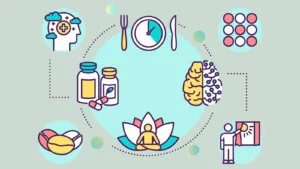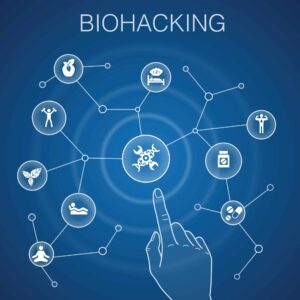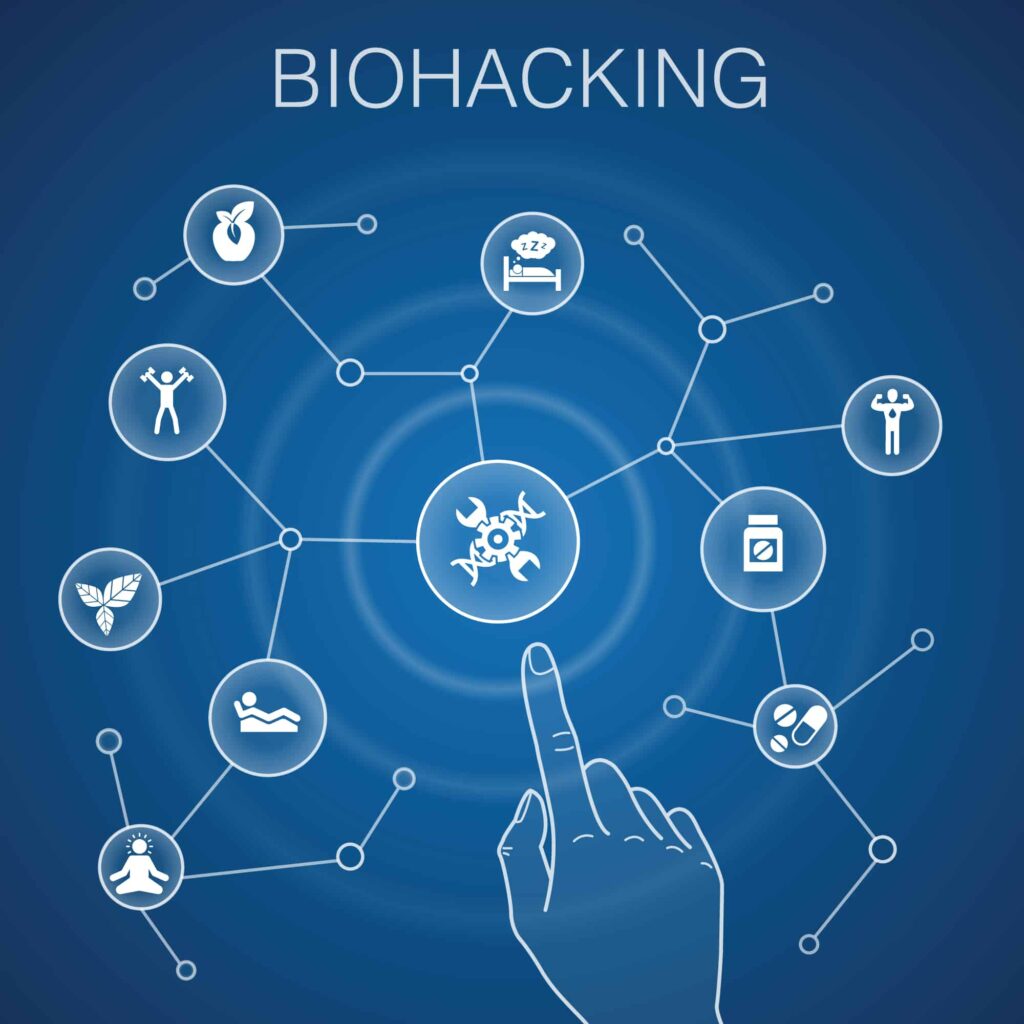Biohacking Is Growing In Popularity
 In an era where technological advancements are not just shaping our external world but also offering unprecedented ways to enhance our internal selves, the concept of biohacking has emerged as a fascinating frontier. From optimizing mental performance to tweaking our biological makeup, biohacking promises a future where the limits of human potential can be redefined. However, as with any groundbreaking innovation, biohacking raises important ethical questions that demand thoughtful consideration.
In an era where technological advancements are not just shaping our external world but also offering unprecedented ways to enhance our internal selves, the concept of biohacking has emerged as a fascinating frontier. From optimizing mental performance to tweaking our biological makeup, biohacking promises a future where the limits of human potential can be redefined. However, as with any groundbreaking innovation, biohacking raises important ethical questions that demand thoughtful consideration.
The purpose of this article is to explore the intricate balance between the innovation and ethical responsibility inherent in biohacking. We will delve into what biohacking is, examine its ethical landscape, and offer guidelines for pursuing biohacking responsibly. Whether you’re a seasoned biohacker or someone curious about dipping your toes into this intriguing world, this comprehensive guide aims to provide you with the insights you need to navigate the ethical complexities of self-enhancement.
What is Biohacking?
Biohacking, a term that has gained considerable traction in recent years, refers to the practice of optimizing human performance through the manipulation of one’s biology. This self-experimentation aims to enhance physical, emotional, and cognitive well-being. While the term may sound like it belongs in a science fiction novel, biohacking is very much a reality and is becoming increasingly mainstream.
The Various Forms of Biohacking
Biohacking can take on many forms, each with its unique methods and objectives:
Nutritional Biohacking: This involves tweaking one’s diet to achieve specific health outcomes. Popular methods include intermittent fasting, ketogenic diets, and the use of supplements.
Digital Biohacking: This form leverages technology to monitor and improve mental and physical states. Tools like BrainTap, wearables, and biofeedback devices fall under this category.
Genetic Biohacking: This is a more advanced form that involves manipulating genes through techniques like CRISPR to achieve desired traits or eliminate genetic disorders.
Physical Biohacking: This includes practices like cold exposure, high-intensity interval training (HIIT), and even chiropractic adjustments to optimize physical performance.
Goals & Benefits of Biohacking
The overarching goal of biohacking is self-improvement. Whether it’s enhancing cognitive function, improving physical stamina, or achieving emotional balance, biohacking offers a plethora of benefits:
Increased Energy: Many biohackers report higher levels of energy and stamina, allowing them to be more productive.
Enhanced Cognitive Function: Through various techniques and tools, biohackers aim to improve memory, focus, and mental clarity.
Emotional Well-being: Practices like mindfulness, meditation, and even technological solutions like BrainTap can contribute to emotional balance and reduced stress levels.
Longevity and Anti-Aging: Some biohacking practices aim to extend lifespan and improve the quality of life in later years.
Popular Tools and Technologies
 In the realm of digital biohacking, various tools and technologies have emerged to assist individuals in their self-enhancement journey. BrainTap, for instance, offers a unique blend of light and sound therapy to improve mental wellness. Wearables like Fitbit and Apple Watch provide real-time data on physical health metrics, enabling users to make informed decisions about their lifestyle.
In the realm of digital biohacking, various tools and technologies have emerged to assist individuals in their self-enhancement journey. BrainTap, for instance, offers a unique blend of light and sound therapy to improve mental wellness. Wearables like Fitbit and Apple Watch provide real-time data on physical health metrics, enabling users to make informed decisions about their lifestyle.
The Ethical Landscape
 Before diving into the ethical concerns specific to biohacking, it’s important to understand some foundational ethical theories that can guide our thinking:
Before diving into the ethical concerns specific to biohacking, it’s important to understand some foundational ethical theories that can guide our thinking:
Utilitarianism: This theory focuses on the greatest good for the greatest number. In the context of biohacking, this would mean evaluating whether a particular practice benefits society as a whole.
Deontology: This approach is concerned with the morality of actions themselves, rather than their outcomes. For example, is it ethical to manipulate one’s genes, regardless of the potential benefits?
Virtue Ethics: This theory emphasizes moral character and aims to answer the question: What kind of person should I be? In biohacking, this could involve considering whether self-enhancement aligns with virtues like humility and respect for nature.
Ethical Concerns in Biohacking
Several ethical concerns arise when discussing biohacking:
Safety: The most immediate concern is the potential for harm. Without proper oversight, biohacking experiments can pose significant risks to individuals and communities.
Consent: Especially in more advanced forms of biohacking, informed consent becomes crucial. Participants should fully understand the risks and benefits before engaging in any biohacking activities.
Accessibility: As biohacking technologies advance, there’s a risk of creating a divide between those who can afford these enhancements and those who cannot, raising ethical questions about equality and fairness.
The Role of Regulation and Oversight
Given these ethical concerns, the role of regulation and oversight becomes paramount:
Self-Regulation: Many biohackers advocate for community guidelines and self-policing to ensure ethical practices.
Government Oversight: Some argue that governmental bodies should regulate biohacking to ensure public safety and ethical compliance.
Third-Party Audits: Independent organizations could provide unbiased assessments of biohacking projects, ensuring they meet ethical and safety standards.
Case Studies in Ethical Biohacking
Understanding theory is one thing, but seeing it in action provides invaluable insights.  In this section, we will explore real-world examples of biohacking projects that have successfully navigated the ethical landscape.
In this section, we will explore real-world examples of biohacking projects that have successfully navigated the ethical landscape.
Case Study 1: The Open Insulin Project
Overview: The Open Insulin Project aims to make insulin affordable and accessible by providing open-source methods for insulin production.
Ethical Considerations: This project addresses the ethical concern of accessibility by making life-saving medication more affordable. It also adheres to safety protocols and encourages community involvement for oversight.
Outcome: The project has garnered widespread support and is seen as a model for ethical biohacking.
Case Study 2: DIY Glucose Monitoring
Overview: Various biohackers have developed DIY glucose monitoring systems to manage diabetes more effectively.
Ethical Considerations: These projects prioritize informed consent, ensuring that users understand the risks and benefits. They also focus on safety by providing comprehensive guidelines.
Outcome: These systems have empowered individuals to take control of their health while adhering to ethical standards.
Case Study 3: BrainTap’s Ethical Approach
Overview: BrainTap offers a technology-driven solution for mental wellness, using light and sound therapy.
Ethical Considerations: The company prioritizes user safety by adhering to scientific research and guidelines. It also ensures informed consent through transparent communication.
Outcome: BrainTap has been widely accepted as an ethical solution in the realm of digital biohacking.
Chiropractic Care & Biohacking
 Chiropractic care, often associated with spinal adjustments and physical well-being, also has profound implications for mental health. By optimizing the nervous system’s function, chiropractic care can be considered a form of biohacking that aims to enhance both physical and mental performance.
Chiropractic care, often associated with spinal adjustments and physical well-being, also has profound implications for mental health. By optimizing the nervous system’s function, chiropractic care can be considered a form of biohacking that aims to enhance both physical and mental performance.
Ethical Considerations in Chiropractic Care
Just like any other form of biohacking, chiropractic care comes with its own set of ethical considerations:
Informed Consent: Before undergoing any chiropractic treatment, patients must be fully informed about the procedures, potential risks, and expected benefits.
Safety and Efficacy: Chiropractors are obligated to adhere to evidence-based practices to ensure the safety and effectiveness of their treatments.
Accessibility: Ethical chiropractic care also involves making treatments accessible to a broad population, avoiding any form of discrimination.
Aligning Chiropractic Care with Responsible Biohacking
Chiropractic care aligns well with the principles of responsible biohacking in several ways:
Community Oversight: Many chiropractic associations provide guidelines and regulations that practitioners are expected to follow, similar to the self-regulation seen in the biohacking community.
Scientific Backing: Responsible chiropractors base their practices on scientific research, much like ethical biohackers who rely on empirical evidence.
Holistic Well-being: Both chiropractic care and biohacking aim for a holistic approach to wellness, considering the interconnectedness of physical, mental, and emotional health.
Guidelines For Ethical Biohacking
 As we’ve explored the complexities of ethical biohacking, it becomes clear that guidelines are essential for anyone embarking on this journey. Below is a checklist that serves as a roadmap for ethical biohacking.
As we’ve explored the complexities of ethical biohacking, it becomes clear that guidelines are essential for anyone embarking on this journey. Below is a checklist that serves as a roadmap for ethical biohacking.
Checklist for Ethical Biohacking
Informed Consent: Always ensure you or the participants in your biohacking experiment are fully aware of the risks and benefits involved.
Safety First: Prioritize safety by adhering to established protocols and guidelines, whether they are community-driven or scientifically validated.
Transparency: Be open about your methods, results, and intentions. Transparency fosters trust and accountability.
Community Oversight: Consider peer reviews or third-party audits to ensure your biohacking activities meet ethical standards.
Accessibility: Make your findings and methods accessible to a broader audience to promote equality and prevent elitism.
Continual Learning: Stay updated on the latest scientific research and ethical discussions related to biohacking.
The Importance of Informed Consent, Safety Protocols, and Continual Learning
Informed Consent: This is not just a legal requirement but an ethical obligation. It ensures that individuals are making educated decisions about their participation in biohacking activities.
Safety Protocols: Adhering to safety guidelines minimizes risks and ensures that the biohacking activities do not harm the individual or the community.
Continual Learning: The field of biohacking is ever-evolving. Continuous learning ensures that you are up-to-date with the latest ethical considerations and scientific advancements.
Additional Resources for Ethical Consideration
Books and Articles: There are numerous publications that delve into the ethics of biohacking. Some recommended reads include “The Ethics of Biohacking” by Dr. Jane Doe and “Responsible Biohacking” by Dr. John Smith.
Online Forums: Websites like Reddit and specialized biohacking forums offer platforms for ethical discussions.
Ethical Guidelines: Many biohacking communities and organizations provide ethical guidelines that can serve as a valuable resource.
Conclusion: The World of Biohacking
 The world of biohacking offers an exhilarating promise: the ability to optimize ourselves for a better quality of life. From enhancing cognitive functions to improving physical well-being, the possibilities seem endless. However, as we venture into this new frontier, it’s crucial to navigate it with ethical integrity.
The world of biohacking offers an exhilarating promise: the ability to optimize ourselves for a better quality of life. From enhancing cognitive functions to improving physical well-being, the possibilities seem endless. However, as we venture into this new frontier, it’s crucial to navigate it with ethical integrity.
We’ve explored the various forms of biohacking, delved into the ethical landscape that surrounds it, and examined real-world case studies that serve as models for responsible practice. We’ve also looked at how chiropractic care, a form of biohacking in its own right, aligns with ethical considerations. Finally, we provided a set of guidelines to help you embark on your biohacking journey responsibly.
As you consider diving into biohacking, remember that innovation should never come at the expense of ethical responsibility. The pursuit of self-enhancement should be balanced with considerations for safety, informed consent, and accessibility. By adhering to ethical guidelines and staying informed, you can explore the exciting realm of biohacking while maintaining a commitment to responsible practice.
Take that step forward—but do so with thoughtfulness, care, and ethical consideration!
BrainTap & Biohacking
 As we’ve explored the ethical dimensions of biohacking, it’s clear that responsible self-enhancement is not just a possibility but a reality. One of the most accessible and ethical ways to start your biohacking journey is through BrainTap. With its scientifically-backed light and sound therapy, BrainTap offers a safe and effective method to improve your mental wellness. Whether you’re looking to enhance your focus, reduce stress, or achieve better sleep, BrainTap provides a holistic solution that aligns perfectly with the ethical considerations discussed in this article.
As we’ve explored the ethical dimensions of biohacking, it’s clear that responsible self-enhancement is not just a possibility but a reality. One of the most accessible and ethical ways to start your biohacking journey is through BrainTap. With its scientifically-backed light and sound therapy, BrainTap offers a safe and effective method to improve your mental wellness. Whether you’re looking to enhance your focus, reduce stress, or achieve better sleep, BrainTap provides a holistic solution that aligns perfectly with the ethical considerations discussed in this article.
 We understand that diving into the world of biohacking can be both exciting and daunting. That’s why BrainTap offers a 14-Day Free Trial, allowing you to experience the benefits firsthand without any commitment. It’s an excellent opportunity to explore how technology can ethically enhance your mental and emotional well-being. So why wait?
We understand that diving into the world of biohacking can be both exciting and daunting. That’s why BrainTap offers a 14-Day Free Trial, allowing you to experience the benefits firsthand without any commitment. It’s an excellent opportunity to explore how technology can ethically enhance your mental and emotional well-being. So why wait?
Take the first step towards ethical self-enhancement by signing up for BrainTap’s 14-Day Free Trial today.


 In an era where technological advancements are not just shaping our external world but also offering unprecedented ways to enhance our internal selves, the concept of biohacking has emerged as a fascinating frontier. From optimizing mental performance to tweaking our biological makeup, biohacking promises a future where the limits of human potential can be redefined. However, as with any groundbreaking innovation, biohacking raises important ethical questions that demand thoughtful consideration.
In an era where technological advancements are not just shaping our external world but also offering unprecedented ways to enhance our internal selves, the concept of biohacking has emerged as a fascinating frontier. From optimizing mental performance to tweaking our biological makeup, biohacking promises a future where the limits of human potential can be redefined. However, as with any groundbreaking innovation, biohacking raises important ethical questions that demand thoughtful consideration. In the realm of digital biohacking, various tools and technologies have emerged to assist individuals in their self-enhancement journey.
In the realm of digital biohacking, various tools and technologies have emerged to assist individuals in their self-enhancement journey.  Before diving into the ethical concerns specific to biohacking, it’s important to understand some foundational ethical theories that can guide our thinking:
Before diving into the ethical concerns specific to biohacking, it’s important to understand some foundational ethical theories that can guide our thinking: In this section, we will explore real-world examples of
In this section, we will explore real-world examples of  Chiropractic care
Chiropractic care As we’ve explored the complexities of ethical biohacking, it becomes clear that guidelines are essential for anyone embarking on this journey. Below is a checklist that serves as a roadmap for ethical biohacking.
As we’ve explored the complexities of ethical biohacking, it becomes clear that guidelines are essential for anyone embarking on this journey. Below is a checklist that serves as a roadmap for ethical biohacking. The world of biohacking offers an exhilarating promise: the ability to optimize ourselves for a better quality of life. From enhancing cognitive functions to improving physical well-being, the possibilities seem endless. However, as we venture into this new frontier, it’s crucial to navigate it with ethical integrity.
The world of biohacking offers an exhilarating promise: the ability to optimize ourselves for a better quality of life. From enhancing cognitive functions to improving physical well-being, the possibilities seem endless. However, as we venture into this new frontier, it’s crucial to navigate it with ethical integrity. As we’ve explored the ethical dimensions of biohacking, it’s clear that responsible self-enhancement is not just a possibility but a reality. One of the most accessible and ethical ways to start your biohacking journey is through BrainTap. With its scientifically-backed light and sound therapy, BrainTap offers a safe and effective method to improve your mental wellness. Whether you’re looking to enhance your focus, reduce stress, or achieve better sleep, BrainTap provides a holistic solution that aligns perfectly with the ethical considerations discussed in this article.
As we’ve explored the ethical dimensions of biohacking, it’s clear that responsible self-enhancement is not just a possibility but a reality. One of the most accessible and ethical ways to start your biohacking journey is through BrainTap. With its scientifically-backed light and sound therapy, BrainTap offers a safe and effective method to improve your mental wellness. Whether you’re looking to enhance your focus, reduce stress, or achieve better sleep, BrainTap provides a holistic solution that aligns perfectly with the ethical considerations discussed in this article. We understand that diving into the world of biohacking can be both exciting and daunting. That’s why BrainTap offers a
We understand that diving into the world of biohacking can be both exciting and daunting. That’s why BrainTap offers a 

